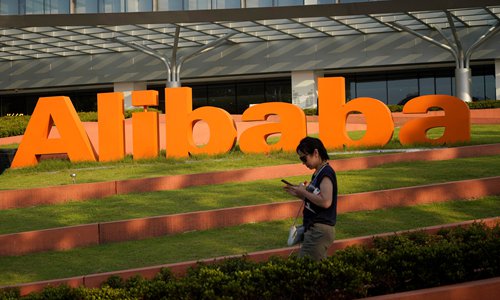HOME >> BUSINESS
Beijing unifies procedures for domestic companies listed on foreign exchanges
Source:Global Times Published: 2019/10/22 20:53:40

The logo of Alibaba Group is seen at the company's headquarters in Hangzhou, East China's Zhejiang province File photo: VCG
Companies registered in China that are listed on overseas exchanges will be subject to a unified company law covering the notice period for holding shareholders' meetings, shareholder's proposal rights and convening procedures, instead of a specialized rule that previously applied to them, the State Council, China's cabinet, said on Tuesday.
Analysts said the new policy marks a significant step in China's financial opening-up.
The policy lifts certain administrative limits and will introduce more foreign capital to the Chinese market amid downward economic pressure from the protracted trade war with the US.
Under the former specialized rule, companies listed overseas had to issue written notices 45 days in advance to shareholders of record.
The Company Law, which applied to domestically registered and listed company, allows these companies to shorten the notice period to about 20 days.
"Foreign capital will move in and out more freely following the policy, and China's governing rules in the financial market will inch closer to international standards," Cong Yi, a professor at the Tianjin University of Finance and Economics, told the Global Times on Tuesday.
China has been accelerating its pace of opening up its financial market over the past year. According to a statement from the State Council Financial Stability and Development Commission, which was released by the central bank in July, China will further open its financial markets with 11 measures.
It will also scrap foreign shareholding limits in securities, asset management and futures firms in 2020, a year ahead of schedule.
China's capital market had been grappling with bubbles, so the past strict regulation on financing overseas was intended to guard against financial risks associated with large inflows of "hot money", Cong explained.
Regulators' ongoing deleveraging efforts have yielded positive results, which means that the country no longer needs such a rule to constrain foreign capital. "It's good timing," Cong added.